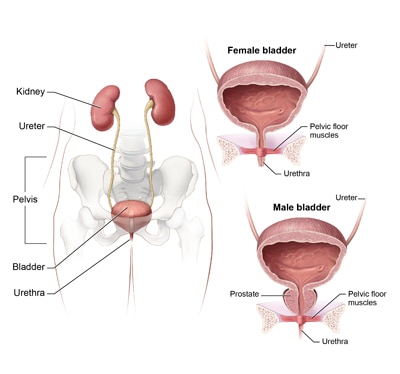Definition & Facts of Interstitial Cystitis
In this section:
- What is IC?
- How common is IC?
- Who is more likely to develop IC?
- What other health problems do people with IC have?
- What are the complications of IC?
What is IC?
Interstitial cystitis (IC), also called bladder pain syndrome, is a chronic, or long-lasting, condition that causes painful urinary symptoms. Symptoms of IC may be different from person to person. For example, some people feel mild discomfort, pressure, or tenderness in the pelvic area. Other people may have intense pain in the bladder or struggle with urinary urgency, the sudden need to urinate, or frequency, the need to urinate more often.
Health care professionals diagnose IC by ruling out other conditions with similar symptoms.
Researchers don’t know the exact cause of IC. Some researchers believe IC may result from conditions that cause inflammation in various organs and parts of the body.
Severe IC symptoms can affect your quality of life. You may feel like you can’t exercise or leave your home because you have to use the bathroom too often, or perhaps your relationship is suffering because sex is painful.
Working with health care professionals, including a urologist or urogynecologist, along with a pain specialist, may help improve your IC symptoms.

How common is IC?
IC is common. The condition may affect between 3 million and 8 million women and between 1 million and 4 million men in the United States.1
Who is more likely to develop IC?
IC can occur at any age, including during childhood, but is most common in adult women and men. About twice as many women are affected as men.1 However, more men may struggle with IC than researchers originally thought.
Some research suggests that women are more likely to develop IC if they have a history of being sexually abused or physically traumatized.2
What other health problems do people with IC have?
Many women with IC are more likely to have other conditions such as irritable bowel syndrome, fibromyalgia, and chronic fatigue syndrome.3 Allergies and some autoimmune diseases are also associated with IC.4
Vulvodynia, which is chronic pain in the vulva that often causes a burning or stinging feeling, or rawness, is commonly associated with IC.2 Vulvodynia has symptoms that overlap with IC.
What are the complications of IC?
The symptoms of IC—such as urgency, frequency, and pain—may lead you to decrease your physical and social activity and negatively affect your quality of life.
Women with pelvic pain or vulvodynia often have pain during sexual intercourse, which can damage your relationships and self-image. Men also can experience pelvic pain that causes uncomfortable or painful sex. Sometimes sex can increase bladder pain attacks, also called symptom flares.
Sexual complications may cause people to avoid further intimacy, possibly leading to depression and guilt. Like many people who deal with chronic pain, people with IC are more likely to struggle with sleep loss due to the frequent need to urinate, and with anxiety and depression.5
Medical tests such as pelvic exams and Pap tests often are painful for women with IC symptoms, especially those who may have pelvic floor muscle spasm. Don’t avoid these tests. Talk with a health care professional about how to make pelvic exams and Pap tests more comfortable and how often you should have them.
References
This content is provided as a service of the National Institute of Diabetes and Digestive and Kidney Diseases
(NIDDK), part of the National Institutes of Health. NIDDK translates and disseminates research findings to increase knowledge and understanding about health and disease among patients, health professionals, and the public. Content produced by NIDDK is carefully reviewed by NIDDK scientists and other experts.
